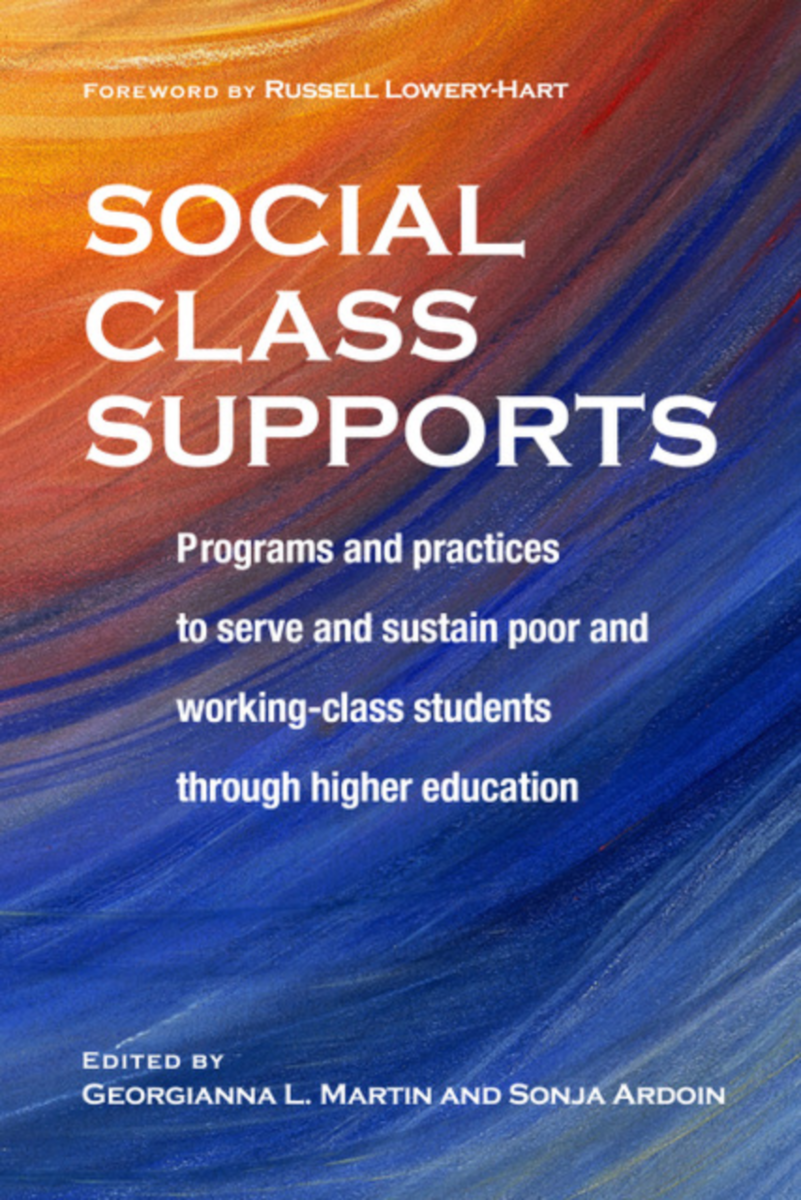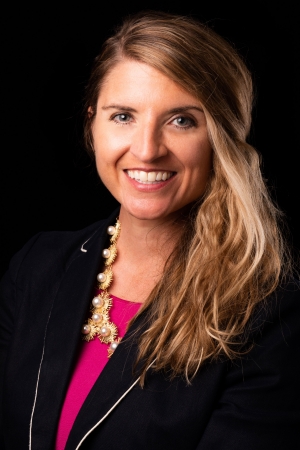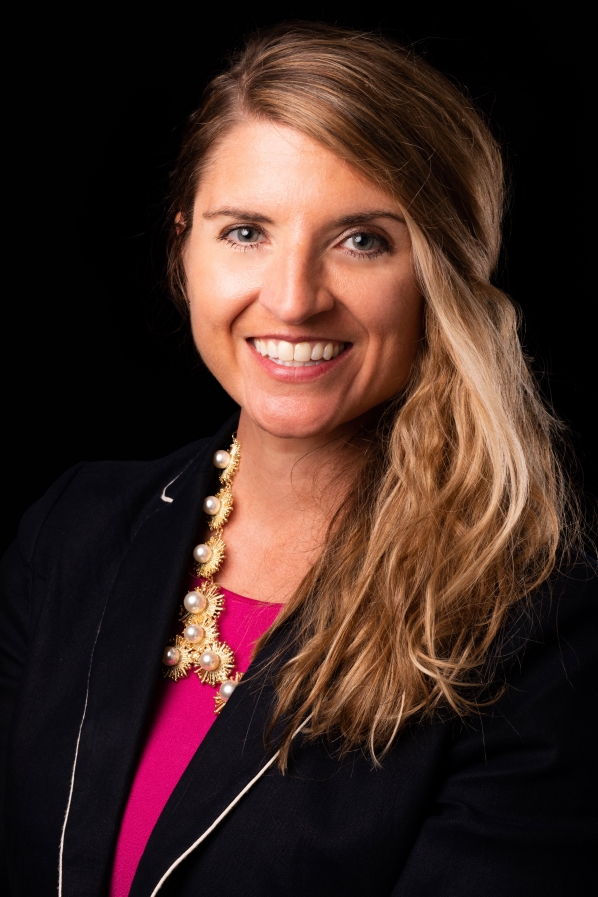Dr. Sonja Ardoin, program director and associate professor of student affairs administration in the Department of Human Development and Psychological Counseling in Appalachian State University's Reich College of Education (RCOE), has co-edited her fourth book, Social Class Supports, with Dr. Georgianna Martin, associate professor of counseling and human development at the University of Georgia. The book was released in July 2021. Organized in six sections, the text offers scalable examples of programs and practices to serve and sustain poor and working-class students through higher education at both two-year and four-year, public and private institutions.
 “We are thrilled to offer this co-edited book to the field of higher education,” said Ardoin. “We hope and believe that it will extend people’s understanding of the experiences of students from poor and working-class backgrounds and share a broad range of scalable examples colleges and universities can implement to better serve and support this population.”
“We are thrilled to offer this co-edited book to the field of higher education,” said Ardoin. “We hope and believe that it will extend people’s understanding of the experiences of students from poor and working-class backgrounds and share a broad range of scalable examples colleges and universities can implement to better serve and support this population.”
“I am grateful to my co-editor, Dr. Georgianna Martin, for inviting me into this project, to Stylus for supporting it, and the 60+ chapter authors who contributed insightful, creative recommendations for practice to the text,” she continued.
Ardoin added, “As someone who was a working-class student myself, I value the opportunity to add to the scholarship on social class and advance social class equity in higher education.”
In a review of the book, Krista Soria, director of student affairs assessment at the University of Minnesota, said, “Utilizing the expertise of students, practitioners, scholars, and faculty, the editors have curated a robust compendium of resources to support poor and working-class college students in higher education.”
“This volume should be read by anyone seeking to center the experiences of marginalized students on their campuses; validate poor and working-class students' strengths, assets, and struggles; disrupt the stratified system of higher education; and dismantle axiomatic cycles of social reproduction on the eternal journey toward social justice, equity, and inclusion.”
She continued, “This volume should be read by anyone seeking to center the experiences of marginalized students on their campuses; validate poor and working-class students' strengths, assets, and struggles; disrupt the stratified system of higher education; and dismantle axiomatic cycles of social reproduction on the eternal journey toward social justice, equity, and inclusion.”
Dr. Russell Lowery-Hart, president of Amarillo College, added, “This important and timely work from Georgianna Martin and Sonja Ardoin help us unpack the link between education and poverty. In doing so, the reports from and about social justice warriors provide the roadmap for higher education to change itself and then change our country.”
Last summer, Ardoin received a grant from the RCOE tied to her work and research on the book as well as the RCOE strategic plan. The grant supported Ardoin in completing the book.
“Dr. Ardoin is dedicated to advancing the field of student affairs administration and underserved students through her research and scholarly endeavors,” said Dr. Melba Spooner, dean of the RCOE. “She is engaging in critical work that will produce transformational change related to college access and success.”
Ardoin earned a Ph.D. in educational research and policy analysis from North Carolina State University, a M.S. in higher education and student affairs from Florida State University, and a B.S. in secondary education from Louisiana State University. She joined the RCOE faculty in 2018.
Ardoin’s research focuses on four areas:
- social class identity in higher education;
- college access and success for first-generation college students and students from rural areas;
- career preparation and pathways for higher education and student affairs;
- student and women's leadership.
She serves the broader field through volunteer roles with ASHE, ACPA, AFLV, the Center for First-generation Student Success, NASPA, and several journal editorial boards, and is engaged as a speaker and consultant.
Counting published and in-press pieces, Ardoin has 35 peer-reviewed publications: four books, one monograph issue, 24 book chapters, and six journal articles, some of which are used by multiple HESA graduate programs across the U.S.
Additionally, in the past six years, Ardoin has received seven small university and association research grants and facilitated 90 presentations at conferences and gatherings. These efforts led to her being named to the 2017-2018 NASPA Emerging Faculty Leader Academy, a 2019-2021 ACPA Emerging Scholar, and the 2021 NASPA Early Career Faculty Award recipient.
Learn more about Ardoin’s work at www.sonjaardoin.com.
Ardoin’s additional work on social class identity can be found in the following publications:
- College Aspirations and Access in Working-Class Rural Communities: The Mixed Signals, Challenges, and New Language First-Generation Students Encounter (Ardoin, 2018);
- New Directions for Student Services: Social Class in Student Affairs (Martin & Elkins, 2018);
- Changing the Narrative: Socially Just Leadership Education (Guthrie & Chunoo, 2018);
- Debunking the Myth of Job Fit in Higher Education and Student Affairs (Reece et al., 2018;
- Straddling class in the academy: 26 stories of students, administrators, and faculty from poor and working class backgrounds and their compelling lessons for higher education policy and practice (Ardoin & martinez, 2019);
- Contested Issues in Troubled Times: Student Affairs Dialogues on Equity, Civility, and Safety (Magolda, Baxter-Magolda, & Carducci, 2019);
- Case studies for student development theory: Advancing social justice & inclusion in higher education (Garvey et al., 2019);
- Student engagement in higher education: Theoretical perspectives and practical approaches for diverse populations (3rd ed.) (Harper et al., 2019);
- Creating sustainable careers in student affairs: What ideal worker norms get wrong and how to make it right(Sallee, 2020);
- New Directions for Student Leadership: Leadership learning through the lens of social class(Ardoin & Guthrie, 2021);
- New Directions for Student Services: The Multiple Identities of Rural College Students (Cain et al., 2021);
- At the intersection: Understanding and supporting first-generation students(R. Longwell-Grice & H. Longwell-Grice, 2021).

